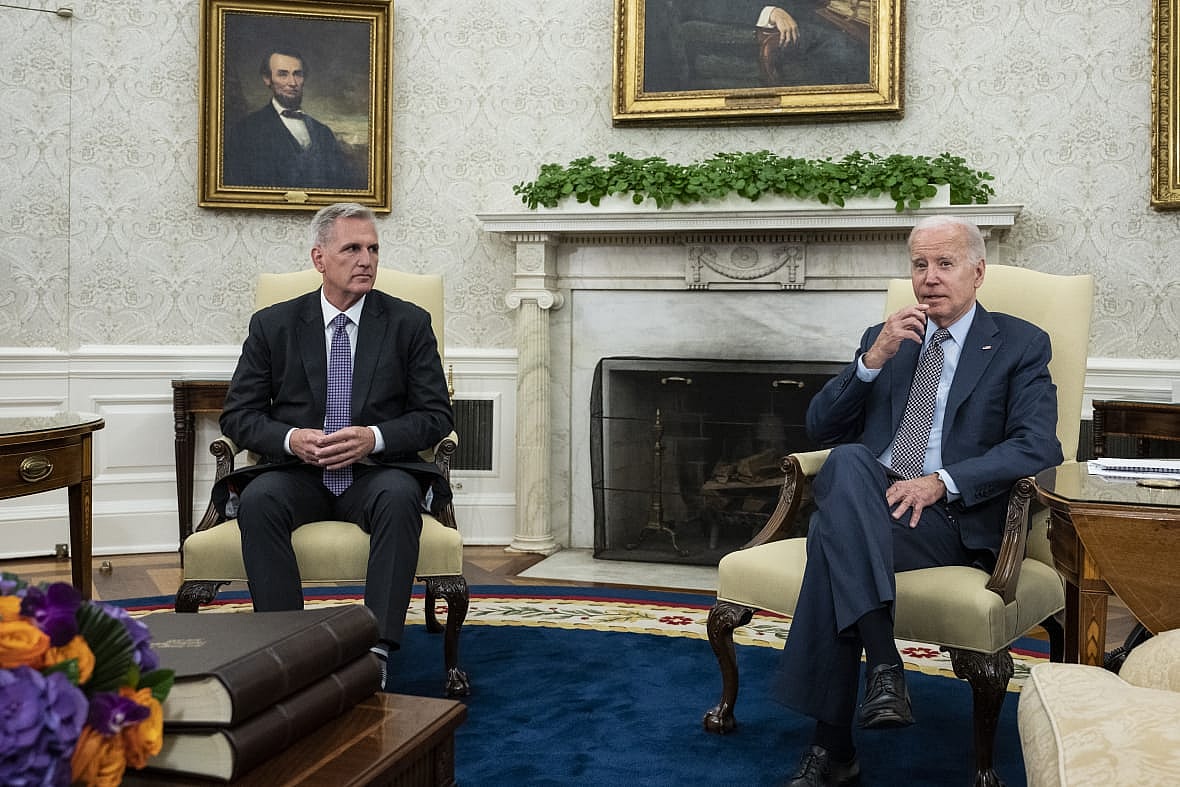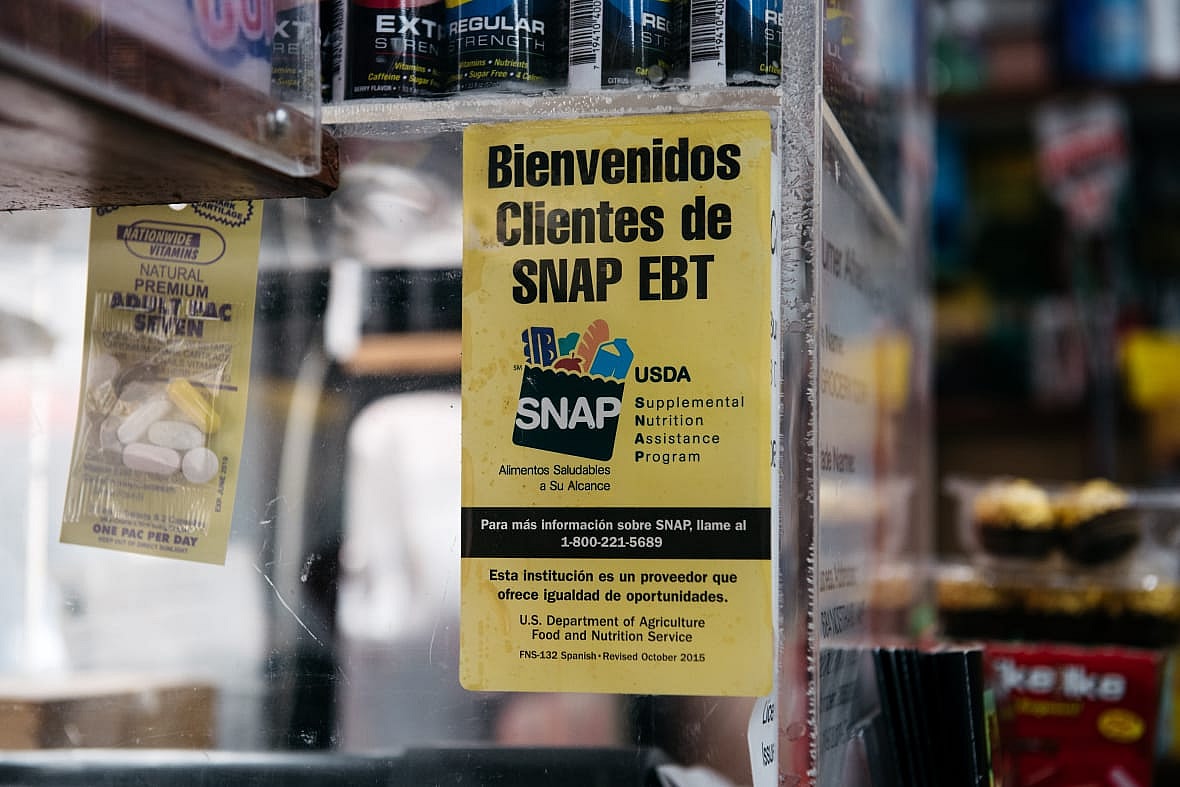As the U.S. Senate prepares to vote on the recently House-passed debt limit deal negotiated between President Joe Biden and Republican House Speaker Kevin McCarthy, R-Calif., policy experts and advocates worry that Black, brown and poor communities are getting the short end of the stick.
The deal, which expands work requirements for certain food stamps recipients among other budget provisions, is a compromise between Democrats and Republicans due to a divided Congress. The Fiscal Responsibility Act will need to be passed by Monday to avoid the nation’s first economic default, according to the latest projections from the U.S. Department of Treasury.

The negotiated deal does not go as far as Republicans hoped, such as requiring work requirements for some Americans on Medicaid and Supplemental Nutrition Assistance Program (SNAP) recipients who are 18–64, able-bodied, and without children. The House GOP plan would have also made broad spending cuts to social safety nets, including cash benefits from the Temporary Assistance for Needy Families (TANF) program.
Instead, the FRA would require minimum work hours for SNAP recipients 18–54, but with exemptions for people who are homeless, veterans and foster youth. The budget legislation also reinstates student loan payments.
The White House has touted the deal as a good compromise that has avoided an economic catastrophe, but policy experts and civil rights organizations argue Black and other vulnerable communities will still suffer economic consequences.
“How can one reasonably consider a deal a compromise that explicitly targets the poor?” questioned Andre M. Perry, economic researcher and senior fellow at the Brookings Institution.
Perry told theGrio that “a real compromise would see all Americans sharing some burden” and that “concessions that are made ostensibly on the backs of the poor is a poorly disguised sacrifice for the wealthy.”
Derrick Johnson, president and CEO of the NAACP, said in a statement released Monday that passing the FRA is critical to avoiding a “cataclysmic default that would disproportionately harm Black communities.”
However, he rejected “onerous” work requirements for SNAP and TANF and called on Congress to “reject specific provisions before final passage,” including the student loan payments and cuts to the IRS “intended to protect wealthy tax cheats.”
Policy experts are dubious of the White House’s claim that the debt limit deal would not increase U.S. poverty levels.

“There are many factors that determine poverty rates,” Perry said. “I don’t think you can pin an increase or decrease in poverty on the debt limit deal. However, in a supposed compromise to pay the government bills, the deal effectively blames the poor for the U.S. not meeting its financial obligations. Then, a tax is levied upon people in poverty.”
Experts at the Center on Budget Policy and Priorities told theGrio it is difficult to fully quantify exactly how the FRA would impact poverty rates for Black and other vulnerable communities, especially because discretionary cuts in the bill remain unknown.
However, they make clear that expanded work requirements can potentially increase poverty.
“This provision will increase poverty because we placed an ineffective and really harsh work reporting requirements to more people,” said Ty Jones Cox, vice president of food assistance at CBPP. “It will prevent a large group of people from being able to get food assistance.”
The work requirement exemptions for veterans, those experiencing homelessness and foster youth are “good and will protect really vulnerable groups of people,” Cox said, but they shouldn’t “come at the expense of adding more people” to SNAP work requirements.
Those who rely on SNAP, including a disproportionate share of Black and brown people, also have “really high levels of health needs that may not rise to the level of disability and receiving disability benefits, but that are potentially work limiting,” noted Cox.

Peggy Bailey, vice president for housing and income security at CBPP, noted that most families who receive cash benefits from TANF are “already living under the federal poverty level,” therefore, the expanded work requirement provisions in the FRA could “deepen poverty amongst those families.”
A recently released CBPP report concluded that despite increased work requirements for TANF, the negative impacts of it should be less than what House Republicans initially passed last month in a partisan GOP bill that was dead on arrival in the U.S. Senate.
“There is no question that what was negotiated by the administration is far better than what the House Republican bill had included,” Bailey told theGrio.
A default would have “hurt way more people,” Cox said, but research consistently shows that work requirements do not “lead to increased earnings or employment” but instead “leads to people being cut off” from essential services they need to survive.
Melanie Campbell, president and CEO of the Black Women’s Roundtable, along with the National Council of Negro Women, sent a letter to the White House and Congress last week urging them to “reject policy changes that would increase poverty,” including expanded work requirements.
While she is disappointed in the final provisions of the Biden-McCarthy deal, Campbell said she understands the politics at play.
“It’s not to reduce the debt. It’s to embarrass the president, win political points [and] get ready for another election,” Campbell told theGrio. “[They] don’t care about the people. It’s all about the politics.”

Campbell applauded the Biden-Harris administration for having a “positive impact on reducing poverty” in the U.S. through policies like the expired child tax credit. Now, she sees the upcoming 2024 election as the only chance for voters and advocates to finish the job of this White House.
“We have an election where we have an opportunity to weigh in on that again, and it’s not that far away,” she said. “Anything bad that happens can also be reversed if you get the right people in office. I think we have to also think strategically about that.”
During Tuesday’s White House press briefing, Shalanda Young, director of the Office of Management and Budget, acknowledged that the administration did not get everything it wanted in the deal and had to compromise with Republicans to prevent a default. She also noted that many other key pieces of legislation that Biden signed into law, like the Inflation Reduction Act as well as the CHIPS and Science Act, remain intact.
“I think this is where you would expect a bipartisan agreement to land. It’s just the reality,” said Young. “There’s not a unified government. They have ideas. We have to listen to them.”
She added, “There’s opportunity to work together … and we have seen that over the last two years with this president and Republicans, and there’s opportunity to keep that going.”

Gerren Keith Gaynor is a White House Correspondent and the Managing Editor of Politics at theGrio. He is based in Washington, D.C.
TheGrio is FREE on your TV via Apple TV, Amazon Fire, Roku and Android TV. Also, please download theGrio mobile apps today!

